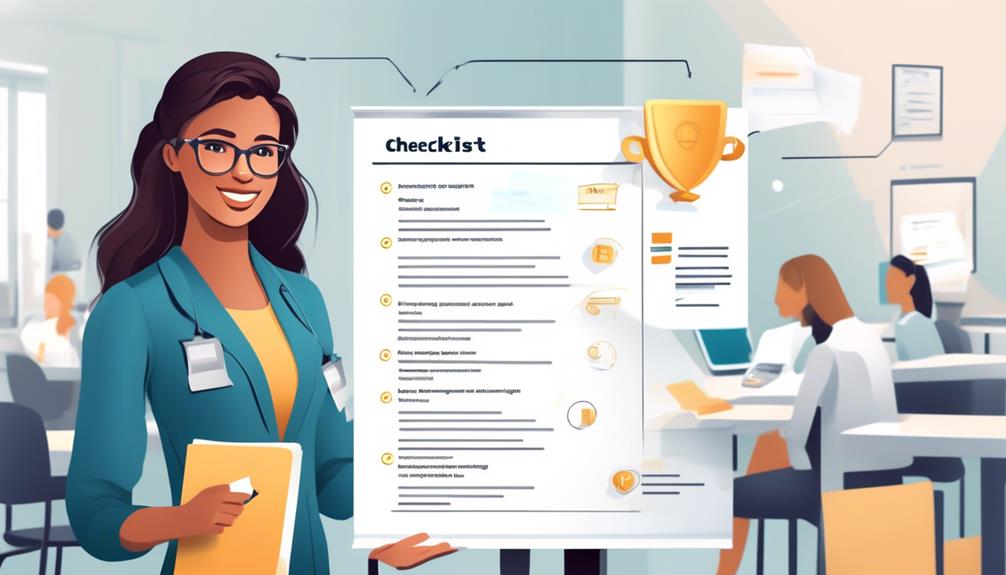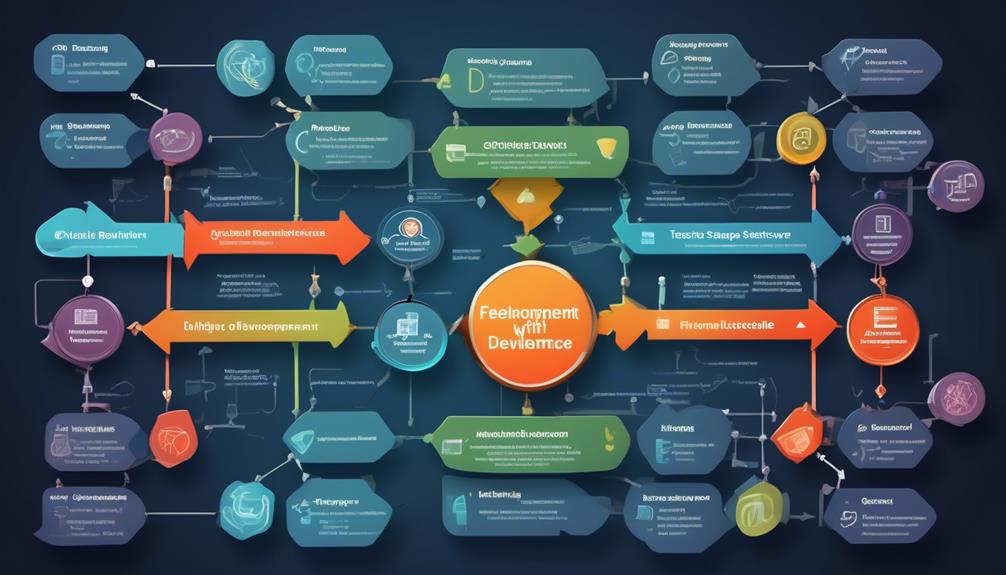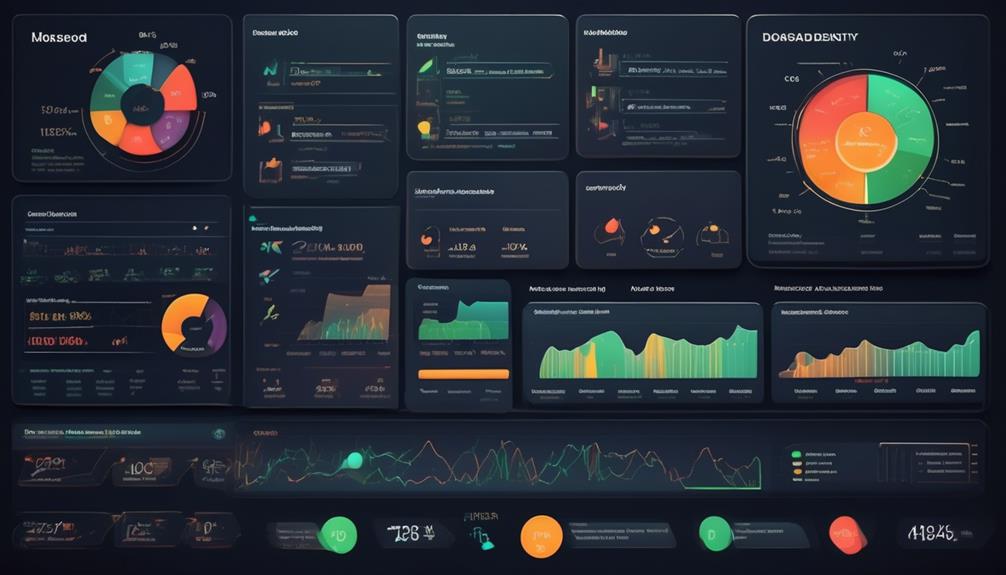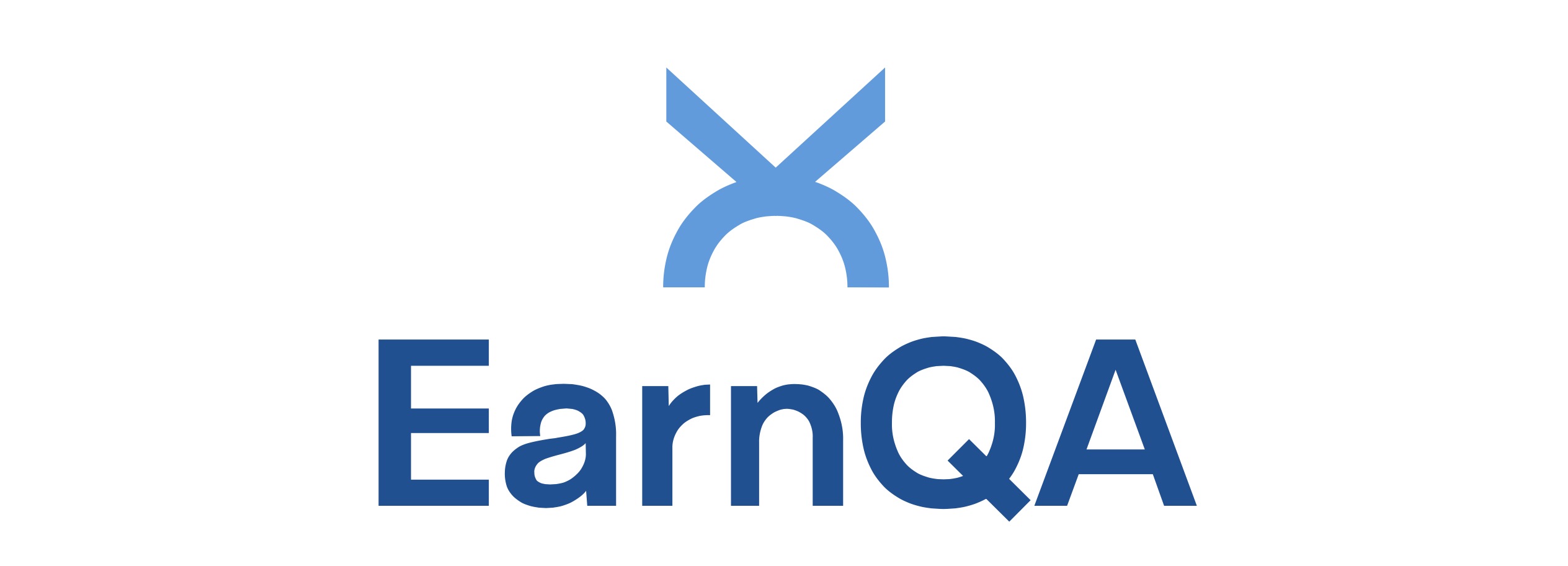SQA Best Practices
Unlock Your Future in Tech: The Ultimate Guide to Enrolling in Certified Software Quality Assurance Programs!
Looking to enroll in certified software quality assurance? Here's a guide to help you get started on the path to becoming a certified software quality assurance professional.

Signing up for a certified software quality assurance course can feel like trying to find your way through a complicated maze of choices and requirements. Many of us have experienced the confusion of feeling bombarded with various certifications and unsure of where to begin.
But fear not, because we’ve got the insider knowledge on how to decipher the process and make it work for you. So, if you’re ready to take the next step in your career and elevate your skills, let’s dive into the essential steps for enrolling in a certified software quality assurance program.
Key Takeaways
- Research and compare different certifications to find the one that aligns with professional goals and aspirations.
- Ensure that you meet the eligibility requirements, including educational background and work experience.
- Select a reputable and accredited training program that offers hands-on experience and practical skills development.
- Familiarize yourself with the prerequisites and exam details for the specific certification, and utilize exam preparation resources to study effectively.
Choosing the Right Certification
Considering the specific type of software quality assurance certification that aligns with our career goals and industry standards is imperative for making an informed decision. As we delve into the realm of Quality Assurance Certifications, it’s essential to meticulously research and compare the prerequisites, fees, and benefits of each certification.
The Certified Software Quality Analyst (CSQA) and Software Quality (CMSQ) certifications stand out as recognized credentials in the field. We need to evaluate the exam structure for each certification, including the number of questions, passing score, and exam duration, to effectively prepare for the rigorous testing process.
Furthermore, we must review the renewal process and the validity period of the certification to strategically plan for ongoing professional development and career growth. It’s important to note that our decision should be based on our educational background, degree, and experience in the field, as the certification shows mastery and expertise in software quality assurance.
Therefore, thorough consideration and attention to detail are crucial in selecting the certification that best aligns with our professional aspirations and goals.
Meeting Eligibility Requirements

To ensure compliance with the eligibility requirements for the chosen certification, it is essential to meticulously review the prerequisites and qualifications, including educational background and work experience. The Software Testing Body offers various certifications, each with its own set of requirements. One must possess a degree from an accredited college or university and have a certain number of years of experience in the field of software quality assurance. Additionally, candidates may need to fulfill specific prerequisites related to the certification exam, such as completing mandatory E-Courses. Below is a table summarizing key eligibility requirements:
Eligibility Requirements Details Educational Background Degree from an accredited college or university Work Experience Minimum of one to several years in software quality assurance Prerequisites for Certification Exam Completion of mandatory E-Courses Additional Requirements Potential waivers for experience based on educational degrees
Selecting a Training Program
When researching and comparing different training programs, it’s crucial to thoroughly evaluate their offerings to ensure they align with our needs and career goals. Look for training programs that provide hands-on experience and practical skills development in software development, QA testing, and quality management. Consider the reputation and accreditation of the training program, as well as the success rates of previous participants who obtained certifications such as Certified Manager of Software and Certified Test Engineer. Additionally, evaluate the cost and duration of the training program to ensure it fits within your budget and schedule. Seek out testimonials and reviews from past participants to gain insights into the quality and effectiveness of the training program.
When selecting a training program, prioritize those that offer preparation for internationally recognized certifications such as ISTQB certification, as these can greatly contribute to career advancement in the field of software quality assurance. It’s essential to choose a program that not only imparts theoretical knowledge but also provides opportunities for practical experience, as this can significantly enhance your skills and readiness for the role of a quality manager.
Registering for the Exam

We must ensure that we meet all the prerequisites and qualifications necessary for registering for the CSQA exam.
To register for the certified software quality assurance (CSQA) exam, one must have completed an E-Course, possess knowledge of bug database software, version control, testing, and the client and server architecture. Additionally, familiarity with quality control and management skills is essential.
The exam consists of 100 Multiple Choice Questions and is designed to evaluate the understanding of software testing, quality assurance principles, and the ability to ensure that software is functional and not broken upon release.
Aspiring candidates should check the eligibility criteria and ensure they’ve the required qualifications before initiating the registration process. It’s also beneficial to consider joining a preparation program offered by professional organizations such as ISTQB, which can provide valuable resources and guidance for exam preparation.
Once the prerequisites are met, candidates can proceed with the registration process, ensuring all required documentation and fees are submitted within the specified deadlines.
Successful completion of the exam will lead to CSQA certification, a valuable asset for software testers and QA analysts seeking to demonstrate their expertise in the field.
Preparing for Certification
Our preparation for certification involves understanding the prerequisites and exam details for the specific certified software quality assurance certification we’re interested in. It’s essential to review the certification course outline and sample exam questions to gauge our readiness. Additionally, taking advantage of exam preparation resources such as books, training opportunities, and question banks can significantly aid in our preparation.
Familiarizing ourselves with the examination process, including its duration, format, and any allowed reference materials, is crucial for success. Considering different pricing and package options can help us find the best fit for our study and exam needs.
As we prepare for certification in software testing at the foundational level, drawing from our experience, skills, and knowledge will be invaluable. Moreover, utilizing reading material recommended by reputable sources, such as ISTQB (International Software Testing Qualifications Board), can provide a comprehensive understanding of the concepts essential for the certification exam.
Our thorough preparation will ensure that we’re well-equipped to excel in the certification process.
Frequently Asked Questions
How Do I Get Into Quality Assurance Software?
To get into quality assurance software, we need to understand the fundamentals of software testing and quality assurance processes. It’s essential to learn about different types of software quality assurance certifications and their benefits for career growth.
Exploring prerequisites and qualifications for advanced-level certifications can help us choose the right path. Additionally, researching specific certifications like CSQA will provide insights into exam details, prerequisites, course outline, pricing, and education waivers.
How Much Does It Cost to Get QA Certified?
Surprisingly, getting QA certified can range from $100 to $420 USD, but additional expenses like exam vouchers and training courses can inflate the overall cost.
Different certification packages offer varying benefits, such as hard copy certificates and extended access to study materials.
It’s crucial to carefully consider the pricing and package options to make a well-informed decision that aligns with our career goals and budget.
What Certification Should I Get to Be Qa?
We should consider the ISTQB Tester certification for QA. It offers advanced-level certifications focusing on monitoring test activities and leading a team effectively.
This certification demonstrates leadership, prepares for advanced roles, and maintains consistent quality.
To enroll, we must meet specific qualifications such as educational background and testing experience requirements.
Additionally, the exam involves 100 multiple-choice questions with a passing score of 70%, proctored online with a webcam and internet connection.
How Long Does It Take to Get a QA Certification?
Obtaining a QA certification’s time frame varies based on the certification level, prior experience, and study intensity. It can take a few weeks of self-study to several days of preparation courses. The duration depends on the individual’s commitment to studying and passing the exam.
As the saying goes, ‘Rome wasn’t built in a day,’ similarly, achieving QA certification requires dedication and thorough preparation. The time needed reflects the complexity and one’s preparation level.
Conclusion
In conclusion, embarking on the journey to become certified in software quality assurance is like embarking on a thrilling expedition.
By carefully selecting the right certification, ensuring eligibility, and enrolling in a top-notch training program, we’re laying the groundwork for success.
With dedication and precision, we’ll conquer the certification exam and emerge as skilled software quality assurance professionals, ready to tackle any challenge that comes our way.
Let’s embark on this adventure together!
Randy serves as our Software Quality Assurance Expert, bringing to the table a rich tapestry of industry experiences gathered over 15 years with various renowned tech companies. His deep understanding of the intricate aspects and the evolving challenges in SQA is unparalleled. At EarnQA, Randy’s contributions extend well beyond developing courses; he is a mentor to students and a leader of webinars, sharing valuable insights and hands-on experiences that greatly enhance our educational programs.
SQA Best Practices
Unveiling the Importance of Quality Assurance in Software Development
Quality assurance in software development ensures that the final product meets the highest standards. It involves testing, bug fixing, and continuous improvement to deliver a reliable and user-friendly software solution.

Do you believe that software development is only about building something functional? Well, take a moment to reconsider that notion.
Have you ever considered the importance of quality assurance in ensuring that the software not only works but works well? Quality assurance in software development goes beyond just fixing bugs; it’s about preventing defects from the get-go.
But how exactly does it achieve this? Join us as we uncover the intricacies of quality assurance and its crucial role in the world of software development.
Key Takeaways
- Quality assurance ensures product quality through proactive and reactive activities.
- QA is an integral part of the software development process.
- QA focuses on meeting user expectations and requirements.
- QA plays a pivotal role in preventing defects and errors.
Understanding Quality Assurance
In understanding quality assurance, we actively ensure product quality through proactive and reactive activities, going beyond testing to ensure the overall quality of the end product.
Quality assurance (QA) is an integral part of the software development process, encompassing all activities that contribute to delivering a high-quality product. QA isn’t limited to testing; it involves a comprehensive approach to quality control and continuous improvement throughout the development cycle.
It’s crucial to embed QA processes at every stage of product development to identify and maintain set requirements, thereby ensuring the reliability and robustness of the end product. Quality assurance specialists play a pivotal role in establishing and maintaining proper processes, ensuring documentation quality, and training the team on best quality practices.
Furthermore, QA isn’t a standalone activity but is deeply intertwined with the entire development process. This integration ensures that quality isn’t just an afterthought but a fundamental aspect of the entire development lifecycle.
As a result, QA is often linked with the ISO 9000 international standard, emphasizing the significance of adhering to rigorous quality standards.
Role in Software Development Lifecycle

Playing a critical role in the software development lifecycle, quality assurance ensures that all stages of the process adhere to rigorous quality standards. Throughout the software development lifecycle, software quality assurance (QA) acts as a control process, continuously monitoring and managing the quality of the product. It’s imperative to implement a defect management approach during development processes, which involves identifying, assessing, and rectifying any deviations from quality standards. QA in software development also focuses on ensuring that the end product meets the expectations and requirements of the user, ultimately enhancing product quality.
Incorporating quality assurance in the software development lifecycle demands a methodical and thorough approach. It involves not only identifying and rectifying defects but also implementing preventive measures to avoid future issues. QA plays a pivotal role in maintaining the integrity and reliability of the software, ensuring that it delivers a seamless user experience. By integrating quality assurance at every phase of the software development lifecycle, organizations can achieve higher customer satisfaction and build a reputation for delivering superior, error-free products.
Principles of Quality Assurance
Ensuring product quality through proactive and reactive activities, quality assurance (QA) incorporates thorough processes, root cause analysis, and documentation quality to prevent errors and maintain set requirements throughout the software development lifecycle.
The principles of software quality assurance are fundamental to delivering a high-quality product. Here are the key principles:
- Integrated QA Processes: QA specialists integrate quality assurance throughout the development life cycle (SDLC), from analysis to deployment phases. This ensures that quality standards are met at every stage of the software development process.
- Continuous Testing and Improvement: QA focuses on continuous testing activities to identify defects early and implement corrective measures. Continuous improvement is at the core of QA processes to ensure the development of reliable and high-quality products.
- Comprehensive Requirement Management: QA specialists establish proper processes to identify and maintain set requirements, ensuring that the end product meets customer expectations and boosts confidence in the delivered solutions.
Implementation of Quality Assurance

With a focus on meticulous processes and attention to detail, the implementation of quality assurance entails establishing rigorous measures to safeguard product quality throughout the software development lifecycle.
Software quality assurance (QA) specialists play a crucial role in ensuring that proper processes are in place to uphold quality standards. This involves conducting thorough software testing, utilizing a quality attributes approach to identify and address key quality characteristics, and implementing regression testing to prevent the reintroduction of previously resolved issues.
Moreover, the implementation of QA involves continuous improvement, with a focus on root cause analysis to learn from mistakes and enhance the development process. QA specialists are also responsible for ensuring documentation quality to prevent errors and expedite development time.
Additionally, they perform audits to meet specific requirements and may collaborate with external auditors when necessary. Furthermore, QA specialists play a pivotal role in training the development team on best practices, thereby fostering a culture of quality within the organization.
Importance in Software Development
Implementing quality assurance in software development is essential for ensuring the delivery of high-quality products that meet customer expectations. The importance of software quality assurance (QA) in the overall quality of software products can’t be overstated. Here’s why:
- Preventing Defects and Errors: QA plays a pivotal role in preventing product defects before they emerge, ensuring stability, reliability, and customer satisfaction. By identifying and addressing issues early in the software development life cycle, the QA team contributes to continuous improvement and the overall quality of the product.
- Maintaining Credibility and Customer Satisfaction: QA ensures that the newly-added goals or requirements don’t compromise software quality, especially for growing and sophisticated applications. This not only maintains the credibility of a company but also boosts customer confidence and improves workflow efficiency.
- Competitive Advantage: By conducting rigorous testing and quality checks, QA offers a real competitive advantage. It ensures that the final product matches the client’s expectations and meets industry standards, thereby enhancing the quality of software products and the success of product development efforts.
Frequently Asked Questions
What Does QA Mean in Software Development?
QA in software development means ensuring product quality throughout the development lifecycle. It involves proactive and reactive activities beyond testing and is prevalent in every phase of the process.
QA specialists establish processes, perform root cause analysis, ensure documentation quality, conduct audits, and train teams on best quality practices.
It helps in identifying and addressing bugs, issues, and potential risks, essential for delivering high-quality products that meet client requirements.
What Are the 4 Types of Quality Assurance?
We can define quality assurance as the systematic process of ensuring that products or services meet specified requirements and standards.
In the realm of software development, the four types of quality assurance are Internal, External, Process, and Product Quality Assurance.
Each plays a crucial role in maintaining overall product quality and customer satisfaction.
What Is the Role of Software Quality Assurance?
We ensure product quality through proactive and reactive activities. Our responsibilities go beyond testing to ensure the end product’s quality.
We’re prevalent in every phase of the software development lifecycle, establishing proper processes, performing root cause analysis, and ensuring documentation quality.
Identifying and maintaining set requirements for developing reliable products enhances our company’s credibility and boosts customer confidence.
Our work is crucial for maintaining high standards in software development.
What Is an Example of Quality Assurance in Software?
What is an example of quality assurance in software?
Consider automated testing frameworks, like Selenium, to ensure functionality across different browsers and platforms. We strategically design test cases to cover various scenarios, ensuring the software performs as expected.
Our proactive approach identifies issues early, preventing potential defects from reaching the end user. By integrating these automated tests into our development process, we maintain high software quality and reliability.
Conclusion
In conclusion, quality assurance in software development is the backbone of ensuring high-quality, reliable, and customer-centric products.
It plays a crucial role in every stage of the development lifecycle, from establishing processes and standards to conducting rigorous testing.
The implementation of QA principles ensures that defects are identified and fixed, ultimately delivering software that meets and exceeds customer expectations.
It’s like the secret ingredient in a recipe, ensuring the final product is nothing short of perfection.
Rick, our Software Quality Assurance Writer, is the creative force behind many of our insightful articles and course materials. His unique background in software development, fused with his natural flair for writing, allows him to convey complex QA concepts in a way that is both informative and captivating. Rick is committed to keeping abreast of the latest trends and advancements in software testing, ensuring that our content remains not just relevant, but at the forefront of the field. His significant contributions are instrumental in helping us fulfill our mission to deliver premier QA education.
SQA Best Practices
Mastering Bug Testing: Expert Tips and Techniques for Software Quality Assurance
Want to improve software quality assurance? Learn how to effectively test bugs and ensure a bug-free user experience with our expert tips on software quality assurance.

Do you believe you have mastered the art of identifying software bugs? Let’s explore the true essence of this skill.
There's more to it than just running a few tests and calling it a day. The world of software quality assurance and bug testing is a complex one, and there are numerous considerations to take into account.
But fear not, we're here to guide you through the essential steps and best practices for ensuring the reliability and performance of your software.
Keep reading to uncover the key insights into how to effectively test bugs and elevate your software quality assurance game.
Key Takeaways
- Understanding the different types of software bugs, such as syntax errors, logic errors, runtime errors, memory leaks, and buffer overflows, is crucial for effective bug testing and resolution.
- Categorizing and prioritizing bugs based on severity and impact helps in efficiently addressing and fixing them.
- Bug identification and resolution processes should involve meticulous issue tracking, real user testing, realistic deadlines, root cause analysis, and detailed insights provided to the development team.
- Bug reporting and communication play a vital role in software quality assurance, including providing essential details, proper classification and prioritization, effective analysis, collaborative communication, and the oversight of the testing process by a Test Manager.
Understanding Software Bugs
Understanding the various types of software bugs is crucial for ensuring the reliability and functionality of a software system.
Software bugs, such as syntax errors, logic errors, and runtime errors, can lead to inaccurate or unexpected outputs.
Additionally, memory leaks and buffer overflows are common types of software bugs that can significantly impact the performance and stability of a software application.
To effectively identify and rectify these bugs, it's essential to utilize a combination of testing approaches and tools.
Comprehensive testing, including unit testing and integration testing, can aid in finding software bugs early in the development process.
Automated testing tools and performance testing can further assist in uncovering bugs related to system resource management and efficiency.
Once a software bug is identified, proper bug tracking and communication with the development team are imperative.
Accurately documenting and prioritizing bug fixing based on severity and impact is crucial for efficient bug resolution.
This approach streamlines the bug-fixing process, enhances overall software quality, and improves workflows in software testing and quality assurance (QA) testing.
Bug Classification in Testing

Bug classification in testing involves systematically categorizing and prioritizing bugs based on their nature and impact to streamline the bug-fixing process. Proper classification allows for efficient allocation of resources and timely resolution of issues, contributing to the overall quality of the software. We can classify bugs based on their severity, such as critical, major, or minor, and also by priority, determining the urgency of their resolution. Below is a table outlining the types of bugs and their impact on the software:
| Type of Bug | Impact on Software |
|---|---|
| Functional Defects | Affect core software functions |
| Performance Defects | Degrade system performance |
| Usability Defects | Impact user experience |
| Security Defects | Pose potential security risks |
Understanding the types of bugs is essential for creating effective test cases and ensuring thorough testing. By classifying bugs accurately, QA teams can prioritize efficiently, focusing on finding and fixing high-impact bugs, ultimately improving the software's performance and reliability.
Testing Process for Bug Identification
When identifying bugs during the testing process, we utilize bug tracking systems to meticulously keep track of each issue and its impact on the software's functionality. This allows us to effectively prioritize and communicate bug reports to the development team, ensuring that they've all the necessary information to address the identified issues.
We also conduct testing under real user conditions, using real browsers and devices to simulate how the software will perform in the hands of actual users. This approach helps us uncover potential bugs that may only manifest themselves in specific environments.
In addition, we define realistic and achievable deadlines for bug fixes, taking into account the severity and complexity of each issue. This ensures that the development team can focus on resolving critical bugs while also addressing less severe issues within a reasonable timeframe.
Furthermore, we analyze each bug to understand its root cause and underlying factors, allowing us to provide detailed insights to the development team for efficient resolution.
Types of Software Bugs

During our software quality assurance testing, we encounter various types of bugs, each with its unique impact on the software's functionality. These include:
- Syntax errors, which result from incorrect code formation or the presence of invalid characters.
- Logic errors, where the code doesn't behave as intended.
- Runtime errors occur during program execution.
- Memory leaks and buffer overflows can lead to wastage or inadequate handling of memory and corruption of data.
Identifying these types of defects is crucial for effective software testing. Our QA team employs both manual and automated testing methods to detect these bugs, ensuring thorough examination of the system to uncover any issues.
Once identified, the severity of each bug is assessed and communicated to the development team to prioritize and address them accordingly.
Understanding the nature of these software bugs is essential for the comprehensive testing of software systems, helping to enhance the overall quality and reliability of the end product.
Importance of Reporting Bugs
As we progress in our software quality assurance testing, the thorough identification and reporting of bugs become pivotal for ensuring the accurate and expected performance of the software.
Reporting bugs is of utmost importance as it provides essential details for developers to understand, reproduce, and effectively resolve the issues.
Proper bug classification and prioritization streamline the bug-fixing process, thereby enhancing the overall software quality.
Moreover, effective bug analysis aids in identifying the root cause and underlying factors of the issue, enabling the creation of new, automated tests to prevent similar bugs in the future.
Collaborative communication and bug prioritization are essential for timely bug resolution and improved software performance.
Test Manager's role in overseeing the comprehensive software testing process, analyzing test results, and ensuring the accurate reporting of bugs can't be overstated.
Therefore, in the realm of software testing, the importance of reporting bugs is undeniable as it directly contributes to the creation of reliable and high-quality software products.
Frequently Asked Questions
How Do QA Testers Find Bugs?
We find bugs through thorough and systematic testing of software applications. Utilizing various testing tools and approaches, we identify bugs and communicate their details to the development team.
Bug prioritization is crucial for focusing on high-priority bugs and ensuring timely resolution. Real-world environment testing and collaboration with developers are essential for efficient bug analysis and resolution.
Do QA Testers Fix Bugs?
Yes, QA testers do find and document bugs, but typically don't fix them. Once a bug is identified, we communicate it to the development team. The development team fixes bugs based on our bug report.
Our bug report covers details like occurrence, expected result, root cause, and solution. Bugs are then categorized into different types for proper management, such as functional, business, or GUI.
How Do You Identify a Bug in Software Testing?
In software testing, we identify bugs through meticulous analysis and rigorous testing. We scrutinize every aspect of the software, from functionality to user interface, uncovering even the most elusive bugs.
We employ a range of testing techniques, including boundary analysis and equivalence partitioning, to ensure thorough bug detection. Our keen attention to detail and analytical approach allow us to identify bugs with precision, ensuring the highest quality software.
What Are the Techniques of Bug Testing?
We use various techniques for bug testing, such as static analysis, unit testing, integration testing, fuzz testing, and debugging tools.
Each method serves a specific purpose in our quality assurance process.
Static analysis tools help us uncover potential flaws in the code, while unit testing ensures individual software components function as expected.
Integration testing examines how different units work together, and fuzz testing generates random inputs to identify potential program crashes.
Conclusion
In the intricate dance of software testing, identifying and reporting bugs is like shining a light on hidden obstacles. By understanding the different types of bugs and categorizing them effectively, we can navigate the path to reliable software.
The art of bug testing is a vital step in the journey towards quality assurance, and it requires careful attention to detail and clear communication to ensure a smooth and reliable software experience.
Rick, our Software Quality Assurance Writer, is the creative force behind many of our insightful articles and course materials. His unique background in software development, fused with his natural flair for writing, allows him to convey complex QA concepts in a way that is both informative and captivating. Rick is committed to keeping abreast of the latest trends and advancements in software testing, ensuring that our content remains not just relevant, but at the forefront of the field. His significant contributions are instrumental in helping us fulfill our mission to deliver premier QA education.
SQA Best Practices
Unlock the Secrets of Success: The Ultimate Guide to Measuring Software Quality Assurance Metrics!
Measuring software quality assurance metrics is crucial for ensuring high-quality products. Learn how to measure and improve software quality assurance metrics for better product outcomes.

In the realm of evaluating metrics for software quality assurance, it is crucial to grasp the right methods for measuring these metrics to guarantee the triumph of software projects. This process involves setting clear objectives for software quality, as well as executing and scrutinizing testing metrics, along with other vital procedures.
According to a recent survey, 80% of software development organizations consider code quality as a crucial metric for assessing overall software quality. This highlights the importance of measuring software quality assurance metrics in order to evaluate the overall success of software projects.
Measuring software quality assurance metrics involves defining clear goals for software quality. These goals should be specific, measurable, attainable, relevant, and time-bound (SMART). By setting SMART goals, software development organizations can effectively measure and evaluate the success of their software projects.
Implementing and analyzing test metrics is another important aspect of measuring software quality assurance metrics. Test metrics provide valuable insights into the effectiveness of the testing process and the overall quality of the software. By analyzing these metrics, software development organizations can identify areas for improvement and take necessary actions to enhance the quality of their software.
In conclusion, measuring software quality assurance metrics is crucial for assessing the overall success of software projects. By defining software quality goals and implementing and analyzing test metrics, software development organizations can ensure the delivery of high-quality software that meets the needs and expectations of their stakeholders.
Key Takeaways
- Defining clear quality goals is essential for assessing software’s performance and effectiveness.
- Metrics play a crucial role in quantifying software’s performance, reliability, usability, and correctness.
- Code quality metrics, reliability metrics, performance metrics, and usability metrics are essential in measuring software quality.
- Implementing and analyzing test metrics and establishing a system for tracking metric data ensure high standards of quality and reliability in software.
Importance of Defining Software Quality Goals
Defining software quality goals is crucial for outlining the desired outcome of the software development process and ensuring that it aligns with overall quality objectives. By establishing clear quality goals, we can effectively measure software quality and ensure that the software product meets the necessary standards. It also enables us to identify and focus on important software quality metrics, such as code quality, testing, and security metrics, which are fundamental in the development of a high-quality software product.
One can’t overstate the importance of defining software quality goals. It not only provides a roadmap for the development process but also serves as a benchmark against which the software’s performance and effectiveness can be assessed. Additionally, it helps in determining the specific criteria by which the success of the software will be measured.
Measuring Success Criteria for Software

Having outlined the importance of defining software quality goals, we now turn our attention to measuring the success criteria for software, which encompasses various metrics to evaluate the software’s performance and effectiveness.
When it comes to software quality, metrics play a crucial role in quantifying the success criteria. Code quality metrics, for instance, provide insights into the software’s maintainability, readability, and the rate of bugs, ensuring a high standard of quality software.
Additionally, reliability can be measured using Mean Time Between Failure (MTBF) and Mean Time To Repair (MTTR), which are vital in assessing the software’s dependability.
Performance metrics are essential for analyzing resource utilization and user satisfaction, ultimately ensuring that the software meets the required performance standards.
Moreover, usability metrics focus on user-friendliness and end-user satisfaction, while correctness metrics ensure that the system works without errors and measures the degree of service provided by each function.
Identifying Essential Software Quality Metrics
To effectively assess software quality, it’s imperative to identify and utilize essential quality metrics that encompass various aspects of performance and user satisfaction.
Code quality metrics are crucial, measuring quantitative and qualitative aspects such as lines of code, complexity, readability, and bug generation rate.
Reliability metrics, including Mean Time Between Failure (MTBF) and Mean Time To Repair (MTTR), assess stability and consistency.
Performance metrics gauge if software meets user requirements and evaluate resource utilization.
Usability metrics focus on end-user satisfaction and user-friendliness, while correctness metrics ensure error-free functionality and measure the degree of service provided by each function.
These metrics collectively provide a comprehensive understanding of software quality, enabling organizations to make informed decisions regarding custom software development, security measures, and overall improvement.
Implementing and Analyzing Test Metrics

As we move into the realm of implementing and analyzing test metrics, our focus on identifying essential software quality metrics serves as a solid foundation for evaluating the effectiveness and reliability of the testing processes.
When implementing and analyzing test metrics, it’s crucial to consider the following:
- SeaLights test metrics
- Visualize test coverage and effectiveness using SeaLights, ensuring that all critical areas of the software are thoroughly tested.
- Track the impact of code changes on test coverage and identify areas that require additional testing.
- CISQ software quality model
- Utilize the CISQ software quality model to measure the quality of the software products through both automated and manual tests.
- Employ the CISQ model to assess the measure of software quality throughout the Testing Life Cycle, ensuring that regression testing is adequately addressed.
In the realm of software quality, understanding the significance of code quality metrics, reliability metrics, user satisfaction measures, and correctness assessments is essential. By implementing and analyzing test metrics, we can ensure that our software meets the highest standards of quality and reliability.
Establishing a System for Tracking Metric Data
Establishing a robust data tracking system is essential for monitoring software quality metrics over time, ensuring that all aspects of code quality, reliability, performance, usability, and correctness are effectively measured.
To achieve this, it’s crucial to implement a data collection system that gathers both quantitative and qualitative data on various metrics. Quantitative metrics involve tracking Mean Time Between Failure (MTBF) and Mean Time To Repair (MTTR) to measure reliability consistently. Performance measurement tools should be used to analyze software performance and resource utilization, ensuring they meet user requirements.
Additionally, a system for tracking end-user satisfaction and user-friendly aspects should be created to measure usability metrics effectively.
Moreover, the data tracking system should focus on gathering information related to the source code, such as test coverage, the frequency of high priority bugs, and the presence of semantically correct code. This will enable the assessment of code quality and reliability over time.
Furthermore, incorporating automated testing into the data tracking system will provide valuable insights into the correctness of the software.
Frequently Asked Questions
How Do You Measure Software Quality Assurance?
We measure software quality assurance by utilizing a combination of quantitative and qualitative metrics.
These include:
- Code quality
- Reliability
- Performance
- Usability
- Correctness
For code quality, we assess factors such as lines of code, complexity, and bug generation rate.
Reliability is measured through Mean Time Between Failure (MTBF) and Mean Time To Repair (MTTR).
Performance is evaluated based on user requirements and resource utilization.
Usability and correctness are gauged through end-user satisfaction and error-free functionality.
How Do You Measure QA Metrics?
Measuring QA metrics involves quantifying code quality, reliability, performance, usability, and correctness. It requires a comprehensive approach that blends quantitative and qualitative assessments.
This involves analyzing factors such as:
- Lines of code
- Bug rates
- MTBF (Mean Time Between Failures)
- MTTR (Mean Time To Repair)
- User requirement fulfillment
- Resource utilization
- User friendliness
- End-user satisfaction
- Degree of service provided by each software function
These metrics offer valuable insights into the overall quality and effectiveness of the software.
How Do You Measure Quality Metrics?
We measure quality metrics by employing quantitative and qualitative measures such as lines of code, bug rates, readability, and maintainability to evaluate code quality.
Reliability is assessed through Mean Time Between Failure (MTBF) and Mean Time To Repair (MTTR).
Performance metrics analyze resource utilization and delivery time.
Usability metrics focus on user satisfaction, while correctness metrics assess error-free functionality.
These measures are essential for setting clear goals and determining relevant quality metrics for evaluation.
What Are Different Types of Metrics to Measure Software Quality?
Different types of metrics to measure software quality include:
- Code quality: This encompasses factors like lines of code, complexity, and bug rate.
- Reliability: These metrics gauge stability and failure response.
- Performance: These metrics analyze time and resource utilization.
- Usability: These metrics assess user-friendliness and satisfaction.
- Correctness: These metrics evaluate error-free operation.
These metrics provide a comprehensive view of software quality, enabling a thorough assessment and improvement.
Conclusion
In conclusion, measuring software quality assurance metrics is crucial for ensuring the success of a software project.
While some may argue that implementing and analyzing test metrics can be time-consuming, the benefits of identifying and addressing potential issues early on far outweigh the initial investment.
By tracking and analyzing essential quality metrics, we can continuously improve the software’s code quality, reliability, performance, usability, and correctness, leading to a more successful end product.
At the helm of our content team is Amelia, our esteemed Editor-in-Chief. Her extensive background in technical writing is matched by her deep-seated passion for technology. Amelia has a remarkable ability to distill complex technical concepts into content that is not only clear and engaging but also easily accessible to a wide range of audiences. Her commitment to maintaining high-quality standards and her keen understanding of what our audience seeks are what make her an invaluable leader at EarnQA. Under Amelia’s stewardship, our content does more than just educate; it inspires and sets new benchmarks in the realm of QA education.
-

 Resources and Training1 day ago
Resources and Training1 day agoMaster Selenium Webdriver Training Today!
-

 SQA Techniques and Tools3 months ago
SQA Techniques and Tools3 months agoUnveiling the Role of Software Quality Assurance: What Do They Really Do?
-

 SQA Techniques and Tools3 months ago
SQA Techniques and Tools3 months agoUnlock Your Potential: How to Become a Quality Assurance Software Tester and Earn a Competitive Salary
-

 SQA Best Practices1 week ago
SQA Best Practices1 week agoElevate Your Tech with Software Quality Assurance
-

 Fundamentals of SQA1 week ago
Fundamentals of SQA1 week agoUnderstanding Definition and Scope of Software Quality Assurance (SQA)
-

 SQA Techniques and Tools1 week ago
SQA Techniques and Tools1 week agoExpert Usability Testing Strategies Revealed
-

 SQA Best Practices1 week ago
SQA Best Practices1 week agoTop SQA Best Practices for Quality Assurance
-

 Fundamentals of SQA1 week ago
Fundamentals of SQA1 week agoHow Do You Structure a Quality Assurance Team?















